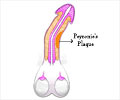Scientists say that they have gained insights into why certain arterial plaques in any given individual eventually lead to an acute blood clot, a heart attack, a stroke, or even sudden death.
Scientists say that they have gained insights into why certain arterial plaques in any given individual eventually lead to an acute blood clot, a heart attack, a stroke, or even sudden death.
The researchers at Columbia University Medical Center, also claim to have identified a key protein that may promote the conversion from benign to dangerous plaques.While a vast majority of atherosclerotic lesions are relatively harmless, some two percent of all plaques turn out to be problematic.
What separates the average blood vessel plaque from those that are at high risk for triggering the development of dangerous, even fatal, blood clots, is the "billion dollar question," says lead researcher Dr. Ira Tabas.
Dr. Tabas believes that the real danger from the fatty deposits lies not with their size, but with what lies underneath the surface of the deposit. The researcher says that rumblings in the core of a deposit, which contains dead cells, can break open the plaques.
Once the plaque ruptures, a blood clot in the lumen of the artery can form.
"It is this sudden clotting that restricts blood flow and can cause a heart attack, stroke, or sudden cardiac death," Dr. Tabas says.
Advertisement
During the study, the research team found that when a specific gene was deleted in two separate strains of atherosclerosis-prone mice, the dangerous plaques were much smaller.
Advertisement
The researcher says that the findings of this study raise the possibility that drugs designed to quiet this form of cellular stress might be useful in treating heart disease.
Dr. Tabas, however, concedes that it may take years before such a therapy is available.
The study has been published in the journal Cell Metabolism.
Source-ANI
ARU














